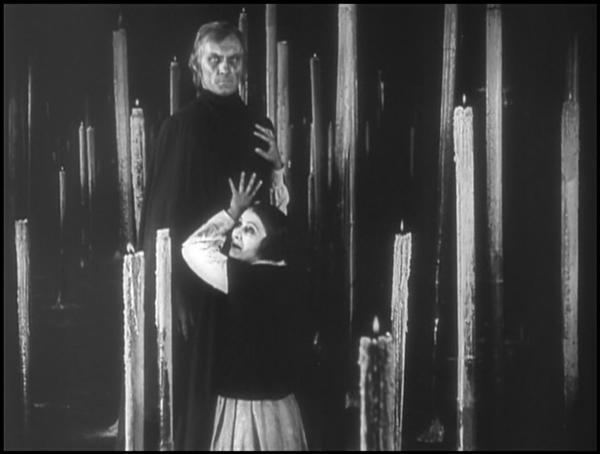At selected cinemas now, and dual format Blu-Ray/ DVD Mon 17 July 2017
There’s been something of a revival in the popularity of silent films in the last few years. It’s not uncommon to see them back in the cinema, restored and rescored; often with live musical accompaniment. Abel Gance’s Napoleon and Lang’s own Metropolis have had recent outings on the big screen, and now it’s the turn of a lesser-known, but no less influential work, Der müde Tod (or Destiny, to give its English title).
Der müde Tod is the tale of a young woman (Lil Dagover), whose lover (Walter Janssen) is taken by Death (Bernhard Goetzke). A glowering, haunted apparition, Death has grown weary with his job and bought land in a small village, around which he has built a massive, impenetrable wall through which only the spirits of the dead can pass. When she sees her lover among them she begs Death to spare him. He gives her three chances, and three lives, each represented by a guttering candle. If he can save her lover in any of the three guises he will return him to her.
Lang’s always fertile imagination takes us to a Muslim Caliphate, Renaissance Venice, and Imperial China. In each section, Dagover must try and rescue her fiancé from the inevitable clutches of the Reaper. The theme of the film is essentially the power of love in the face of death. “Love is as strong as death,” Dagover asserts. The lugubrious psychopomp takes no joy in repeatedly proving her wrong. Setting aside the obviously problematic depiction of the exotic time and places (particularly the Persian and Chinese sections), Lang updates what we now recognise as the tropes of German Expressionism to these unfamiliar settings. The various colour tints add to the visual feast. it’s not quite up there with the gorgeous insanity that permeates every frame of Metropolis, but Lang was a brilliant stylist even then as he layers this beautiful canvas over the thin frame of the plot.
There are shots that still resonate. The flickering candles are as effective a shorthand for the fragility of life as you could imagine, and Death grimly holding the baby beautifully illustrates his weary sense of duty. This is a film that influenced the likes of Hitchcock, Powell and Pressburger, and Buñuel (to say nothing of Bergman’s indelible depiction of Death in The Seventh Seal, with a thematic thread that lingers in the likes of Darren Aronofsky’s The Fountain. It’s as overwrought and melodramatic as silent films tend to be, but this is a painstakingly restored slice of history in which to luxuriate.
